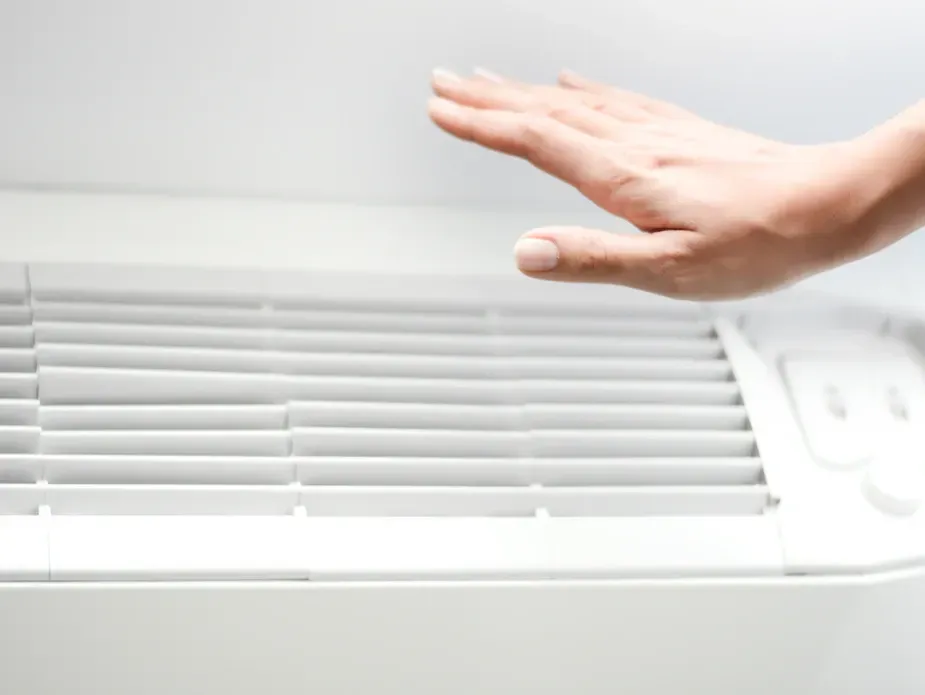
Lifestyle Blogs

How Air Conditioners are Sabotaging your Health & Efficiency Silently?
A lot of people living in the cities, along with the millennials today, have become very quick at making decisions based on one and one thing only - and that is their level of physical comfort. This is so because under the explanation of high stress conditions, long working hours, work from home, lack of time or lack of patience it is considered ok, if comfort is the primary factor behind all decision making.
But does that really help always and is that the right way to go about things? Or are you damaging your well being in many ways by making yourself a prisoner of your own habits by always seeking highest levels of comfort over what's good for you in the long term?
One such comfort that people are very quick to turn to as soon as the summer hits their cities is the use of air conditioners. Sometimes it's as early as spring that the air conditioners are switched on and run through the night.

I still remember the time when we were growing up, when my grandfather would never put on the cooler even during the hottest months of the year unless we were sleeping in the afternoon and at night he used to try to make us sleep on the terrace, under the stars, just with a table fan to keep the breeze coming and to get rid of the mosquitoes. It used to be extremely hot in the beginning but slowly the temperature would start dropping and it first became comfortable and then it would get really cool towards the morning.

As kids we hated this and this was usually during our summer vacations, but it was a very profound lesson we were given in understanding nature and trying to adjust our comfort to be in connect with the weather as much as we could. And that is exactly why today I can stay without air conditioners through most of the day and teach my kids the same. When we put it on, it is for extremely brief periods and at a temperature just below room temperature without making it extremely chilly either during the day or at night.

That way when you do use the air conditioners you enjoy the change even more because it's brief and being used at times when you should absolutely use it like getting restful sleep or while working when the temperatures are soaring outside.

Again, it's very convenient to think about our comfort and keep it on the whole day and whole night but then that has its own side effects other than the fact that your body is just not in sync with nature or the weather outside. In my opinion, just being indoors in excessive heat conditions is something to be grateful for, because there are many who don’t even have that luxury.

Funnily, feeling hot and being comfortable is a very relative thing. The more you train your body to be comfortable at room temperature the lesser the cooling you need and for lesser periods of time.
Even today I have a water cooler in my house, to cool some rooms, the same ones we all had in our house growing up when there were no air conditioners. Even today, I prefer to put it on while working from home, in conditions of dry heat and it has a lot of other benefits as well which I will cover in another post.

Downside of excessive use of air-conditioners:
The first downside is, the more you use it the more you need it. This simply means that at the first given chance when you start feeling the heat is unbearable and you decide to put on the air conditioners, you haven't really given your body a chance to adjust and acclimatize to the changing weather. Being in an artificial cooling environment, makes the body get adjusted to this lower temperature as the new normal, and then it demands some more of the same comfort. As a result the threshold of tolerating heat becomes lower and lower, and the need to have an air conditioner running at a lower temperature and at a higher frequency, becomes more and more. This whole vicious cycle only makes you feel hotter and more uncomfortable due to low ability of adaptability by your body.

It doesn't allow the body to get a chance at heat acclimatization which is a process where the body undergoes physiological changes that better allow the body to handle heat. For heat acclimatization to occur, the body's core temperature increases gradually over a period of a couple of weeks so that the body is able to adapt to the changing temperature outside.
Physiological adaptation after heat acclimatization
Once the body is acclimatized you will notice some physiological adaptations that will happen which include
Increased sweating and sweating quicker due to a lower core body temperature due to acclimatization.

Body temperature will be lower for the same work rate which means that the more work can be done at hotter temperatures.
Sweat lost will be less salty leading to less loss of electrolytes.
The body becomes more efficient at re-absorbing salt from the sweat which helps you to stay better hydrated In the heat reducing chances of a heat stroke.

Heart rate during rest and at work ( or exercise) will be lower. Due to the low heart rate the amount of blood being pumped out by the heart with every heartbeat is more resulting in more oxygen supply to the muscles. This allows you to work for prolonged periods of time in the heat without any fatigue or cramping.

The body's core and skin temperature stays low due to more efficient sweating by the body and that can help in adapting better to the heat and lesser use of air conditioners once acclimatized.
Although heat acclimatization is a great process to prevent heat related injuries like heat stroke and heat cramps for people working outdoors. It can also allow everyone to be able tolerate the heat better along with reducing the use of air conditioners and finding alternate ways of cooling the body through the consumption of right food and drinks during the summer.
List of chronic conditions that can arise secondary to use of Air Conditioners
Other things that can go wrong with your health with excessive use of air conditioners:
Respiratory tract infections
Sinus related disorders including severe facial tenderness.
Allergic issues from rhinitis, dry eyes to skin allergies
Nerve related disorders including paresis and neuralgias.
Breathing difficulties
Dehydration
Dry and itchy skin
Headaches and migraines.
Loss of skin turgor and skin eruptions.
What changes can you make?
At the first site of spring changing into summer, do not be remote happy and start switching on all the air conditioners in the house. Use the first 2-3 weeks to acclimatize your body to changing weather. Get your body comfortable with the changing temperature. And use the air conditioners very sparingly or not at all.
Use other methods to cool yourself and your house like keeping your house shaded, keep many indoor and outdoor plants which help improve the cooling inside and around your house.

Get into the habit of bathing twice a day or whenever you feel excessively hot. This is a much simpler way to beat the heat and will give longer relief as it is able to cool your body very effectively.

Using red brick work for your indoor walls helps retain the cooling and keeps out the heat in areas of severe heat wave.
Waking up early gives you a chance to start your day when the environment is very cool, even in the summers, and gives you a chance to get in some physical activity like a walk or mild to moderate exercise before the sun beats down on you. This way your body is more comfortable and doesn’t get drained out after the exertion and sweating helps cool your internal environment.

Staying well hydrated is the key to beating the heat which I can’t stress enough, along with consumption of fruits and vegetables specific to the summer season which are very high on their water content as well.

Spend some time in nature both in the morning and evening as that helps you to keep in touch with the real temperature and humidity levels rather than being in an artificial environment most of the day because of which you become intolerant to nature.

Sweat it out via physical activity to keep your body cool and to keep yourself invigorated. But make sure you do it in controlled amounts and gradually rather than doing this in spurts and suddenly.
If you do not allow natural thermoregulation of your body’s internal environment, you will always be more prone to heat cramps or a heat stroke when you occasionally move out of the comfort of your controlled environment.

Also you might be unable to carry out work outdoors for even moderate periods of time without getting fatigued very quickly.
If you are used to working out or exercising then too, the body’s physiological adaptation to hot weather allows for an efficient and productive workout without any injury, when the body’s core temperature is elevated at the time of strenuous exercise in hot weather. Else you might be prone to workout related injuries or extreme fatigue after workouts.
Take Home Message
So the moral of the story is to :
Use your air conditioners gradually and sparingly.
Spend a few weeks getting adapted to the changing weather to allow your body to tolerate the heat better and be comfortable in a natural environment for longer periods of time.
Do not lower the temperature of the air conditioner too much and for too long. Keep the temperature just around comfortable and switch it off when you are comfortable and see for how long can you stay in the ambient temperature.
Use the energy saving feature to allow the ac to go into thermostat mode to return to room temperature constantly. This way you also save electricity and reduce your carbon footprint along with saving your health.
Get your ac serviced before use to reduce the chance of air-borne infections and allergies/breathing problems.
Try to allow in natural light and air wherever you have acs at home or in the office to prevent circulation of stale air or a damp moist environment which promotes growth of molds inside the acs, exacerbates sinus related disorders and various allergic problems.
Continuous and direct exposure from air conditioners at very low temperatures can give rise to nerve related disorders especially facial nerve palsy as I had seen in many of my own patients.
Remember when we use things properly and with discretion, it doesn't mean we are punishing ourselves or staying away from luxuries that we can afford rather it means that we have learnt to use it in a way that is optimal for our body, our comfort and our environment.
Wouldn't it be nice if we could find the solution to so many of our health problems by just changing the way we live in our day to day lives rather than making visits to the hospital repeatedly for medication or surgery or both to treat these chronic problems by turning a blind eye to our won role in creating them in the first place.
It's never too late. Begin Today..........Change the way you live and see the difference.
© Neha Bhandari Rao | Privacy Policy | Terms
